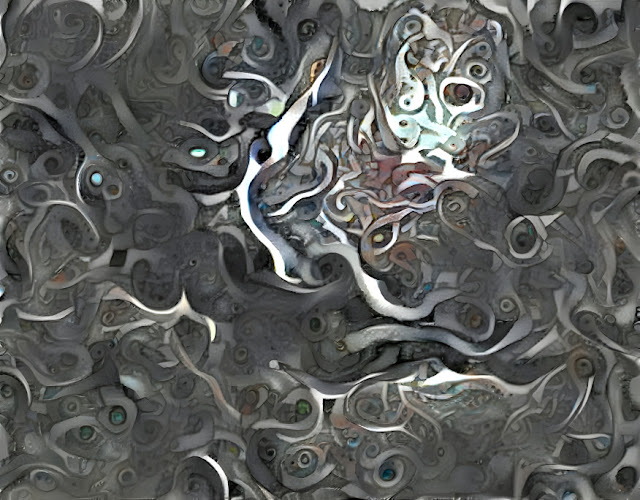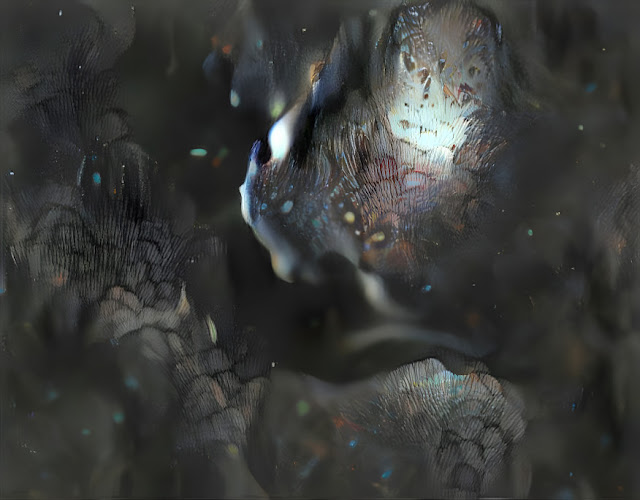photography + digital artwork by Shaun Lawton

The image above, to me, seems to represent perhaps some old, weathered piping deep underground, polished over time by running water beneath the topsoil, of what's left of some ancient ruins stemming from a subterranean Dwarven fortress. Perhaps it's the locking mechanism from an ancient gateway that once separated the cavernous realm of Khazad-dûm from the rest of middle-Earth. Or maybe it's the remains of an old carburetor or the twisted wreckage of an ancient Aztec sculpture; it's difficult to pinpoint, exactly.
Now that we're more thoroughly nested within the continuum referred to as "the 21st century," with its deep fake images receding into the darkest corners of a world wide web having taken on a life of its own, we are at least mentally equipped enough that we might recognize such an image as being itself fabricated from any variety of source images, rendering the final form of it in some manner to be counterfeit. Yet is not that the very precinct of art itself? If we assume that the word art may serve as the prefix for artifice and everything "artificial," then yes, but when we lean back and relax on the thought that beautiful artworks, from abstract sculptures carved out of marble to vivid paintings which reflect, through light itself, startling images to our eyes, we do get a sense of the inherent value of such a contrivance. The images shown here should hardly be thought of as counterfeit, considering there remains no real precedent to which they stay attached, at least not one which could effectively substitute them.
From a a teaspoon of spilled water on a stone countertop to the above image, I've been left here to trace the random lineage of appearance and its endless forms of similitude. Right off the bat I should introduce the above image as having resulted from my uploading a source image (the photograph I snapped of our friend's kitchen counter top with some water spilled on it you see at the very bottom of this post) into an online free photo editor (befunky, my random choice of freely available and easy to use photo editors) and messing with the brightness / contrast / colors until achieving a darker and more interesting look. Then I uploaded that resulting image (a .jpg . . . do I look like I know what a .jpg is) into Deep Dream Generator and after pairing it with a separate image and making some minor adjustments, the image morphed into several different forms (see two of them below), made possible by my switching out some of the "style" images in DDG for experimentation, until it resulted in the top three iterations you see posted here.

Why are these iterations so alluring and interesting looking? My guess is that the source image must've been rich with visual cues and elements which lend themselves in highly adaptable ways to the VQGAN + CLIP programs that enable AI algorithms to generate random iterations of two separate images fused together like this. There must be a plethora of scintillating color cues embedded within the light captured in the original photo reflecting off the polished stone table top and off the curved surface of the water spill itself to produce a myriad different combinations of results, ensuing in a multiplicity of possible iterations when you consider that there's no limit to the second "style image" you might choose to utilize in crafting your deep dream generative artworks.

I love this one a lot, something about the textures evoke not just obsidian but some sea-shell like aspects, as if it were at the bottom of a deep river or some reflections off volcanic glass in a rainforest lagoon. These evocative hues and patterns which can be elicited from tweaking certain source images taken with a smartphone and then ran through a basic online photo editor before being paired with stylistic images to generate countless disparate iterations will continue to keep me inspired on my new mission to conjure Rorschachian portraits which reflect a cornucopia of pareidolia-enhanced visual representations that I would very much like to frame and call "art."

Here's the original source image, the snapshot taken from my iPhone of a kitchen table top, with some water spilled on it. I remember focusing on the water spill from a certain angle in order to capture the light from the ceiling reflecting off the water itself to the point it resembled a dragon's head. Pleased with the results, little did I know then that this singular image would evolve into the even more interesting and mystifying images depicted above, resulting from my introduction to the world of VQGAN + CLIP art. The secret which makes this particular mundane photo so effective at having been decoded and rearranged, I would guess, lies in the very fact that it depicts water atop a bright, reflective counter top with the added bonus of having light reflected off both the water and the polished stone surface.
I find myself drawn to the intricate details and textures in this artwork.
ReplyDelete